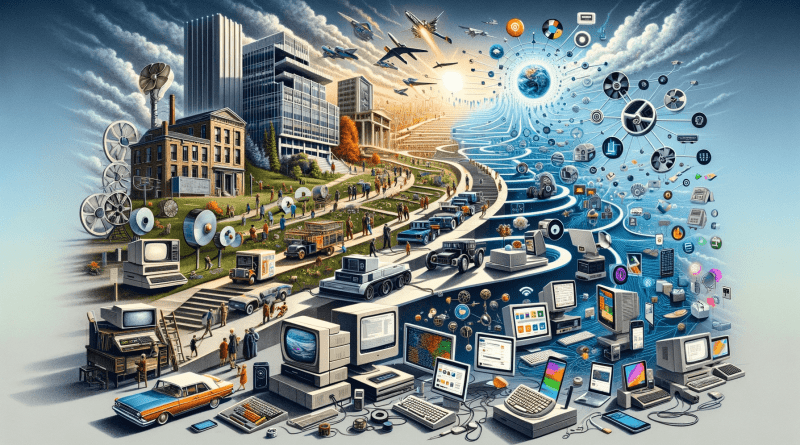When and Where Was the Internet Invented?
The invention of the Internet marks a pivotal moment in human history, revolutionizing how we communicate, gather information, and conduct business. The Internet’s origin dates back to the 1960s, and its journey from a governmental communication tool to a global phenomenon is a story of innovation and collaboration.
The Genesis of the Internet
In the 1960s, computers were large, immobile machines, and accessing information required physical presence or magnetic tapes sent via mail. The U.S. government, motivated by the Cold War and the Soviet Union’s launch of Sputnik, sought to create a resilient communication network. This led to the creation of the Advanced Research Projects Agency Network (ARPANET), which laid the foundation for the Internet.
ARPANET and the Evolution of Networking
ARPANET initially connected computers at various universities and research institutions, fostering information sharing. Membership was exclusive, prompting the creation of other networks. On January 1, 1983, ARPANET adopted the Transfer Control Protocol/Internetwork Protocol (TCP/IP) standard, marking the official birth of the Internet and enabling diverse computer networks to communicate seamlessly.
The Birthplace and Pioneers of the Internet
The Internet, a collaborative endeavour, was not the brainchild of a single inventor. Its prototype emerged in the United States over 50 years ago, during the Cold War. The first significant network, ARPANET, was founded in 1968, with the first successful long-distance networking between computers at UCLA and Stanford in 1969. Computer scientist Vinton Cerf played a crucial role in the late 1970s, developing protocols that allowed different networks to communicate, forming a worldwide network.
The World Wide Web and Public Accessibility
The World Wide Web (WWW), invented by Sir Tim Berners-Lee in 1989, transformed information sharing, introducing hyperlinks and user-friendly web browsers. The WWW became publicly accessible on April 30, 1993, thanks to the efforts of the European Organization for Nuclear Research (CERN). This move democratized the Internet, leading to the creation of browsers like Mosaic and the emergence of social media platforms in the mid-2000s.
The Internet’s Impact on Society
The Internet has integrated itself into every facet of modern life, influencing how we interact, work, and consume. The development of broadband and mobile Internet has made high-speed connections accessible, paving the way for streaming services and on-the-go connectivity. The Internet of Things (IoT) has further connected our world, automating and enhancing various aspects of daily life.
What Did We Learn Today?
From its origins as a governmental tool to its current status as a global network, the Internet has undergone a remarkable transformation. Its birth on January 1, 1983, with the adoption of TCP/IP and its public accessibility in 1993, are critical milestones in this journey. As we look to the future, the Internet’s role in societal development and innovation continues to be of paramount importance.
Frequently Asked Questions About the Internet
1. What is the Internet?
The Internet is a global network of interconnected computers and computer networks. It allows for the communication and exchange of information between users located worldwide. The World Wide Web and email are two of the most popular components of the Internet.
2. When and where was the Internet invented?
The Internet originated in the United States during the 1960s as a project of the Department of Defense, aiming to connect computers at various universities and research institutions. The ARPANET was the first successful implementation of this project, and it laid the groundwork for the development of the modern Internet.
3. Who played a significant role in the creation of the Internet?
Many individuals and organizations contributed to the development of the Internet. Key figures include Vinton Cerf and Robert Kahn, who developed the TCP/IP protocols, and Tim Berners-Lee, who invented the World Wide Web.
4. What is the World Wide Web?
The World Wide Web (WWW) is a system of interlinked hypertext documents and multimedia content accessible via the Internet. It was invented by Tim Berners-Lee in 1989 and has since become one of the most used services on the Internet.
5. When was the Internet made available for public use?
The Internet became widely accessible to the public in the early 1990s. On April 30, 1993, CERN placed the World Wide Web into the public domain, making it freely accessible to everyone.
6. How has the Internet evolved over the years?
The Internet has evolved significantly since its inception. It has transitioned from a network primarily used for research and academic purposes to a global communication, information, and commerce platform. The introduction of web browsers, e-commerce, social media platforms, and mobile Internet has played a crucial role in this evolution.
7. What impact has the Internet had on society?
The Internet has transformed various aspects of society, including how we communicate, access information, shop, and work. It has made information more accessible, facilitated global communication, and created new economic opportunities.
8. How can I access the Internet?
To access the Internet, you need a device with networking capabilities (such as a computer or smartphone), a modem, and an Internet Service Provider (ISP) that provides you with access to the Internet.
9. What is an Internet Service Provider (ISP)?
An ISP is a company that provides Internet access to individuals and businesses. ISPs connect users to the Internet via various data transmission technologies, such as broadband, DSL, or dial-up.
10. What are the security considerations when using the Internet?
It is essential to take security precautions when using the Internet to protect your personal information and device from malicious attacks. This includes using strong passwords, keeping your software updated, and being cautious when clicking on links or downloading files from unknown sources.
11. Is Wi-Fi the same as the Internet?
Wi-Fi is a technology that enables devices to connect wirelessly to a local network, while the Internet is a global network of computers. In escape rooms, Wi-Fi can connect different electronic components and create interactive and immersive puzzles, although this doesn’t necessarily require an Internet connection.

